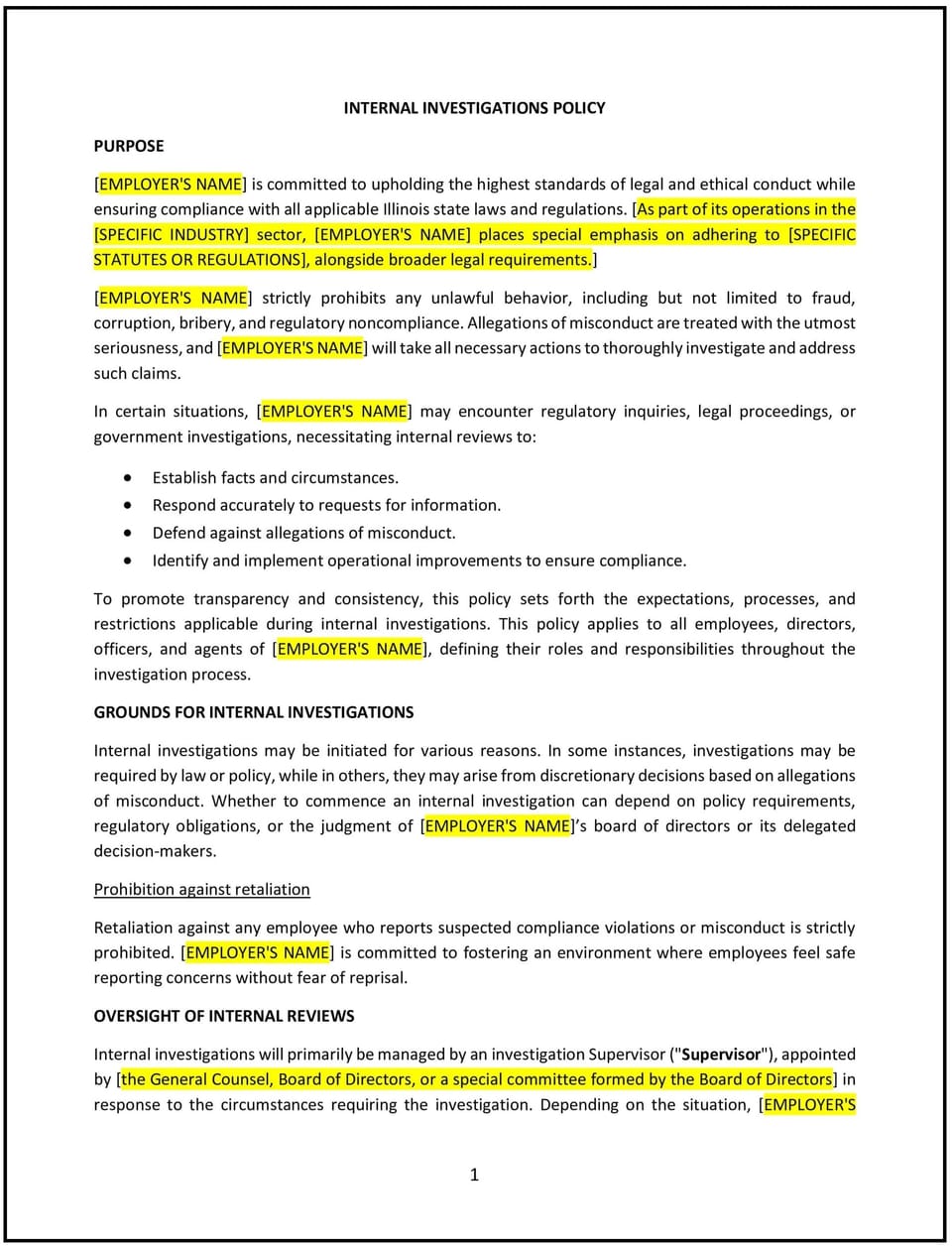Internal investigations policy (Illinois): Free template

Internal investigations policy (Illinois)
This internal investigations policy is designed to help Illinois businesses address workplace concerns, such as misconduct, policy violations, or compliance issues. It establishes procedures for initiating, conducting, and resolving investigations while promoting compliance with Illinois and federal laws, such as the Illinois Whistleblower Act.
By adopting this policy, businesses can promote fairness, maintain confidentiality, and resolve issues effectively.
How to use this internal investigations policy (Illinois)
- Define scope: Specify the types of concerns covered, such as harassment, discrimination, theft, or policy violations.
- Outline reporting procedures: Detail how employees can report concerns, including designated reporting channels such as HR, compliance hotlines, or managers.
- Assign investigation roles: Identify who will conduct investigations, such as HR representatives, legal counsel, or third-party investigators.
- Emphasize confidentiality: Ensure that all investigations are conducted confidentially and shared only with authorized personnel.
- Provide investigation steps: Include procedures for collecting evidence, interviewing witnesses, and maintaining thorough documentation.
- Address employee rights: Clarify that employees involved in investigations will be treated fairly and have the opportunity to provide input.
- Establish resolution protocols: Specify how findings will be addressed, including corrective actions, policy updates, or disciplinary measures.
- Monitor compliance: Regularly review investigation processes to ensure they align with Illinois laws and workplace policies.
Benefits of using this internal investigations policy (Illinois)
This policy provides several benefits for Illinois businesses:
- Promotes fairness: Ensures that all concerns are investigated impartially and consistently.
- Enhances compliance: Aligns with Illinois and federal laws, reducing the risk of legal disputes or penalties.
- Protects confidentiality: Safeguards sensitive information during investigations to maintain employee trust.
- Resolves issues effectively: Provides a structured process for addressing workplace concerns and implementing corrective measures.
- Supports accountability: Clarifies roles and responsibilities for conducting and resolving investigations.
Tips for using this internal investigations policy (Illinois)
- Communicate the policy: Share the policy with employees during onboarding and include it in the employee handbook.
- Train managers: Provide training to managers on recognizing and reporting concerns and supporting investigations.
- Use impartial investigators: Assign neutral individuals or third-party investigators to ensure objectivity.
- Document thoroughly: Maintain detailed records of all investigations, findings, and actions taken.
- Update regularly: Revise the policy to reflect changes in Illinois laws, workplace practices, or best practices for investigations.
Q: What types of concerns are covered under this policy?
A: This policy covers concerns such as harassment, discrimination, theft, fraud, policy violations, and other workplace issues.
Q: How can employees report concerns?
A: Employees can report concerns to HR, their manager, or through designated channels such as compliance hotlines or email.
Q: Who conducts internal investigations?
A: Investigations are typically conducted by HR representatives, legal counsel, or third-party investigators to ensure impartiality.
Q: How is confidentiality maintained during investigations?
A: Investigations are conducted confidentially, with information shared only with authorized personnel directly involved in the process.
Q: What steps are included in an internal investigation?
A: Steps include collecting evidence, interviewing witnesses, reviewing relevant documentation, and maintaining a thorough record of findings.
Q: What actions are taken if a concern is substantiated?
A: Corrective actions may include disciplinary measures, policy updates, or training to prevent future issues.
Q: How often is this policy reviewed?
A: This policy is reviewed annually or whenever significant changes occur in Illinois laws or workplace practices.
Q: Are employees protected from retaliation for reporting concerns?
A: Yes, employees are protected from retaliation under this policy and Illinois laws such as the Illinois Whistleblower Act.
This article contains general legal information and does not contain legal advice. Cobrief is not a law firm or a substitute for an attorney or law firm. The law is complex and changes often. For legal advice, please ask a lawyer.


